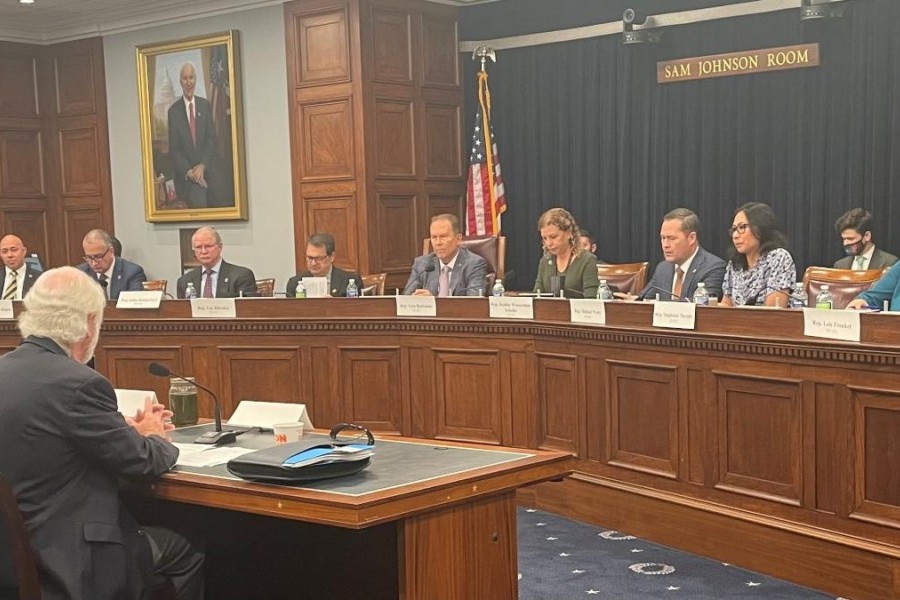During a Congressional hearing of the Florida Delegation in Washington, D.C. on Nov. 3, 2021, Mote Marine Laboratory & Aquarium’s President & CEO Dr. Michael P. Crosby was invited to provide his expert testimony regarding the urgent water quality-related challenges facing Florida’s marine ecosystems and the steps that can be taken to combat harmful algae blooms, restore Florida’s Coral Reef, and address the loss of seagrasses that have led to an unusual mortality event devastating Florida’s manatee population.
U.S. Reps. Vern Buchanan (R-Fla.) and Debbie Wasserman Schultz (D-Fla.) co-chaired the bipartisan delegation, consisting of 29 members of Congress from Florida, for the first time since February 2020. Joining Buchanan and Wasserman Schultz during the meeting were U.S. Reps. Gus Bilirakis, Kathy Castor, Mario Diaz-Balart, Neal Dunn, Lois Frankel, Scott Franklin, Carlos Gimenez, Brian Mast, Stephanie Murphy, John Rutherford, Darren Soto and Michael Waltz.
“We are grateful to the leadership of Representatives Buchanan and Wasserman Schultz, and the entire Florida Delegation, for prioritizing water quality issues, which are vital to the wellbeing of our state,” said Crosby. “While Florida may be facing a number of environmental challenges related to water quality issues, including harmful algae blooms and devastation along Florida’s Coral Reef, our state is also home to leading scientists that are working to solve those problems with strong support from the State.” He urged the Florida Delegation to help ensure that federal agencies provide financial support to at least match the level of the State’s significant investment in science-based solutions to these environmental challenges.
For example, Dr. Crosby proposed that the Florida Red Tide Mitigation & Technology Development Initiative—enacted by the Florida Legislature and signed by Governor DeSantis in 2019—serve as a highly successful model that could be easily expanded with federal agency support, as the strategies developed through the Initiative could potentially be applied to other types of harmful algae blooms across the state and country. The current initiative is led by Mote in partnership with the Florida Fish and Wildlife Conservation Commission and focuses on developing innovative strategies to combat Florida red tide, and now incorporates over 20 partnering organizations.
In order to address the current manatee Unusual Mortality Event resulting from a seagrass die-off on the east coast, Crosby also proposed that the Delegation consider establishing federal support for a consortium of seagrass aquaculture nursery and restoration facilities, one on each coast of Florida, to strategically and effectively restore seagrasses, the manatee’s primary food source, within Florida’s four National Estuaries.
Dr. Crosby closed his testimony with a statement of strong support for the Restoring Resilient Reefs Act legislation that Senator Rubio and his co-sponsors have put forward in the Senate and that Representative Soto and his co-sponsors have put forward in the House. However, he also emphasized to the Delegation that it is absolutely vital that the original bill language that guarantees a proportion of conservation grant funding is provided to qualifying Coral Reef Stewardship Partnerships and allows “non-profit marine research organizations” to be eligible to qualify as Coral Reef Research Centers be maintained in the final legislation. Without the inclusion of this critical language, these bills will be gutted of two primary vehicles for real success by getting funds out of the agencies and into the hands of those organizations that actually develop and deploy innovative science-based coral restoration technologies in partnership with local communities.
While there are over 260 staff members, including nearly 40 PhD-level scientists, and over 20 diverse research programs at Mote, science education and public outreach are also areas of focus, including providing legislators and policymakers information about the best-available science. “We look forward to continuing to engage with the Florida Delegation to ensure that we’re working together to improve the environment and enhance Florida’s ‘blue economy’ for years to come,” added Crosby.
Learn more about Mote research and other programs at mote.org


